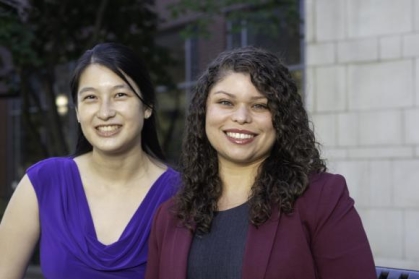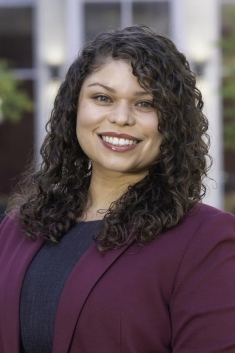Meet the Inaugural Rutgers Law Equity and Inclusion Fellows

A new Rutgers Law fellowship helps bridge the teaching gap for aspiring professors from under-represented communities.
Law teaching has long been an elite club, mostly populated by white men. A new Rutgers Law School fellowship is looking to change that, by helping aspiring law professors from under-represented communities make their way into the legal academy. The Equity and Inclusion Fellowship provides two years of mentoring, teaching experience, time to write, and coaching, after which fellows will receive assistance entering the teaching job market and finding desirable positions.
“Many people of color and others do not get the mentoring and support needed in law school or beyond to navigate through a system that can be quite confusing and opaque,” says Kim Mutcherson, co-dean and professor of law. “Our hope is that over time we’ll play a useful role in diversifying the legal academy as we have done in diversifying the profession in general. And, if we’re lucky, some Fellows may actually choose to stay with us beyond their fellowship years.”
Meet the two inaugural Equity and Inclusion Fellows who began their positions this fall.

Andrea Johnson
Andrea Johnson spent about a decade practicing employment discrimination and civil rights law when she decided to change tracks. “Like a lot of people during the pandemic, I started to reevaluate my goals and consider whether I was working towards what I had set out to do when I went to law school,” she says. “I realized that I had veered off the path I started when I began my practice and knew there were probably better ways to address civil rights issues than working on cases that often impact one individual at a time.”
Johnson set her sights on academia, where she could influence countless law students and conduct research that could potentially impact the practice as a whole. There was just one problem: it’s not always easy to break into academia mid-career. She decided to pursue fellowship opportunities, first at West Virginia University where she served as a litigation fellow, and now at Rutgers Law School, where she’s an inaugural Equity and Inclusion Fellow. “This fellowship is a wonderful and rare opportunity to develop myself on the academic market and focus on research and teaching in an area that interests me,” she says.
Johnson’s research as a fellow will leverage her experience in discrimination law, and address how intersectional and changing concepts of identity should be handled by the law—whether it’s race, ethnicity, gender identification, or sexual orientation. “Demographics and identities alike are both changing, but often the law hasn’t caught up,” she says. “Since perceptions of identity play a part in how people are treated, it’s important that the law adapt to the lived experiences of various populations and provide meaningful remedies instead of barriers.” In addition to addressing this topic in her research, Johnson’s goal is to also teach a class on changing identity, performative identity, and related interpretations of the law.
In the end, Johnson believes that her experience in practice gives her a unique perspective on the human element of case law, and one that she’s excited to impart on her students. “You can read a case and glean some ideas of what the law is and what judges consider, but there’s nothing like working with people and seeing firsthand how their life is impacted by the law,” she says. “That’s an element that’s not reflected in court opinions and will inform my research and interactions with students throughout this fellowship.”

Margaret H. Zhang
Margaret Zhang’s interest in how law affects pregnant, postpartum, and disabled people began when she herself was pregnant and postpartum. In 2015, she had just graduated law school, and she needed to request an accommodation for the bar exam. “Despite the fact that I had completed three years of law school and felt confident working through paperwork and red tape, the process was incredibly challenging,” she says. “That experience stuck with me. I wanted to use my degree to make a difference and improve experiences for people like me—and those with less training and education than I had.”
Zhang worked as an attorney for four years, helping pregnant and postpartum clients tackle issues related to workplace and education discrimination. Before long, she realized her clients weren’t being sufficiently served by the law’s standard reactionary framework and, instead, began advising her clients to plan proactively for their needs and rights as their circumstances changed throughout pregnancy and parenthood. “My goal with this fellowship is to fine tune and publish research that lays out how the law and lawyers can work to assist this population proactively before discrimination occurs,” she says.
First, Zhang’s research will make the case for why the law and lawyers should take a more preventative approach to avoid or reduce not just pregnant and postpartum people’s loss of rights and income, but also adverse health outcomes. Then, she will offer a rubric of preventive changes that legislatures, courts, administrative agencies, and lawyers can adopt to deliver timely justice to this population. “My goal is to provide the scholarly research that I wish I had when I was in practice,” she says.
Looking ahead, Zhang hopes to continue working at the intersection of teaching, scholarship, and lawyering. “I want to be involved in the training of future lawyers while also being able to help people, whether it’s through scholarship, providing legal assistance, or some combination of the two,” she says. “This fellowship is a transformational opportunity for me as a working parent: it gives me the time and space that I need to research, write, and make a contribution to the scholarly discussion about pregnancy justice.”